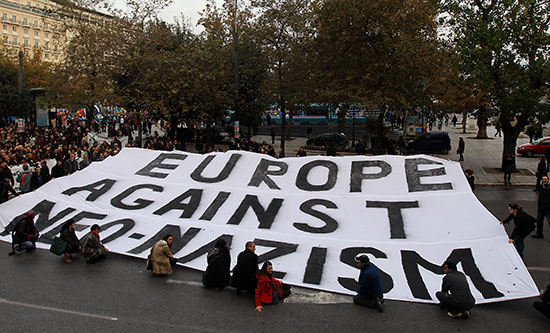
Anti-migrant xenophobia is spreading around Europe as far right parties make electoral gains. But so too is resistance, predominantly by the people most directly affected.
Hungary
At the parliamentary election on 8 April 2018, Viktor Orban’s right-wing anti-immigrant coalition Fidesz-KDNP won 49.27% of the vote, allowing it to form its third successive government with 133 seats out of 199. Extreme right-wing party Jobbik increased its representation from 23 to 26 seats; while social democratic MSZP-Dialogue seats fell from 30 to 20.
In the last three years Orban has brought in:
- a new force of armed ‘border hunters’ to patrol a steel and barbed wire fence around the border;
- two ‘transit zones’ at the Serbian border, through which only five asylum seekers are processed each week;
- legislation allowing a ‘state of emergency’ to be declared, closing those border crossing points (already exercised multiple times);
- detention ‘shelters’ in which to indefinitely detain migrants.
The latest anti-migrant policy is the so-called ‘Stop Soros’ legislation, designed to empower the government to ban NGOs that support migration and therefore, in the eyes of the government, pose a ‘national security risk’. Included in the legislation is a 25% tax on foreign donations to NGOs and restraining orders on activists to stop them from approaching the EU’s external borders in Hungary.
Following the election, Budapest saw 100,000-strong demonstrations, protesting against the lack of press freedom and calling for fresh elections.
Greece
Since 2016, the Moria ‘registration and reception’ camp on the island of Lesbos has been the site of repeated riots against poor treatment and increasingly harsh immigration policy.
The camp was planned to house 1,500 people and to be an alternative to overcrowded detention centres and police stations, but now hosts more than double that number in increasingly harsh conditions, with poor access to medical facilities.
On 3 May a general strike took place in Lesbos in protest against the EU migrant policy that has seen over 15,000 migrants and refugees stranded in similar camps on Chios and three other islands in Greece. Around 2,500 demonstrators took to the streets of Lesbos’s main port; some attempted to overturn a police bus which was part of a large state mobilisation against the protest and were fired upon with tear gas.
On 7 May a Greek court cleared five members of international aid groups from Spain and Denmark, who had helped rescue migrants from the sea in 2016, of charges of illegally bringing migrants into Greece.
Germany
On 30 April police in Ellwangen, near Stuttgart, attempted to detain a 23-year-old Togolese man for deportation but were stopped by 150–200 other refugees who surrounded the two patrol cars until the officers handed over the keys to the Togolese man’s handcuffs.
Clearly threatened by the mass self-defence action of usually powerless refugees, the vice president of the local police force said he would ‘not allow any law-free zones to be established’ and initiated a retaliatory operation to re-establish police authority. Police raided the refugee centre where they had met resistance three days earlier with several hundred armoured police and arrested the Togolese man. One officer and several migrants were injured in the raid, with three being taken to hospital.
Interior Minister Horst Seehofer called the migrant resistance a ‘slap in the face of the law-abiding population’. Responding to pressure from the far right, Seehofer has vowed to implement new procedures to limit the overall number of asylum seekers and deport those deemed ‘criminal and extremist’, as well as building new British-style detention centres.
The populist far right Alternative for Germany party made significant strides in the September 2017 elections as its share of the vote rose by 8%, boosting its parliamentary seats by 13%.
France
On 22 April the National Assembly passed a new immigration bill further restricting asylum claims, shortening application deadlines, doubling the time that ‘illegal migrants’ can be detained, introducing a one-year prison sentence for entering France illegally, and reducing the time allowed to appeal a negative decision to 15 days.
Two days later, on 24 April, armed French border guards raided an advice clinic for migrants planning to undertake the dangerous Alpine crossing from Italy into France, conducted by the NGO Rainbow4Africa in the train station in the Italian town of Bardoneccia. The guards forced a Nigerian man to provide a urine sample for a drugs test. A volunteer who witnessed the incident said the man had Italian identity papers and a train ticket to Paris. French authorities later confirmed that the test was negative.
Fight Racism!
Across Europe – just as in Britain – there are countless such examples of increasing state racism. Only organised solidarity action, involving both the migrants affected and the rest of the working class can counter this onslaught. When state-sanctioned xenophobia tries to divide our communities, we can beat it with solidarity.




